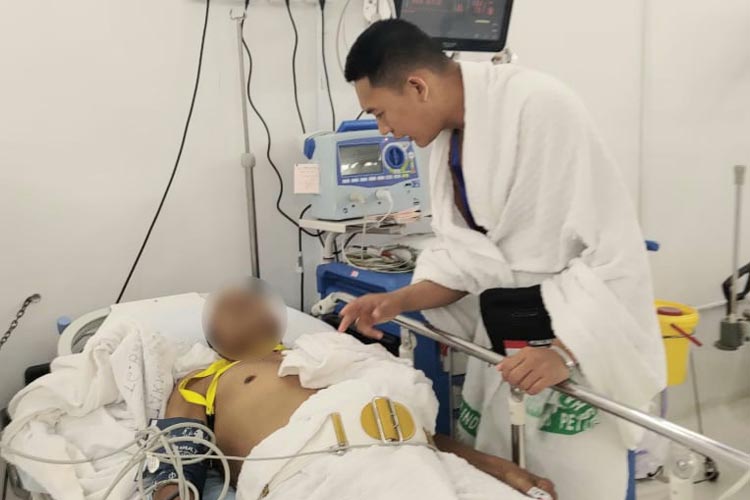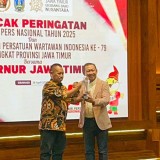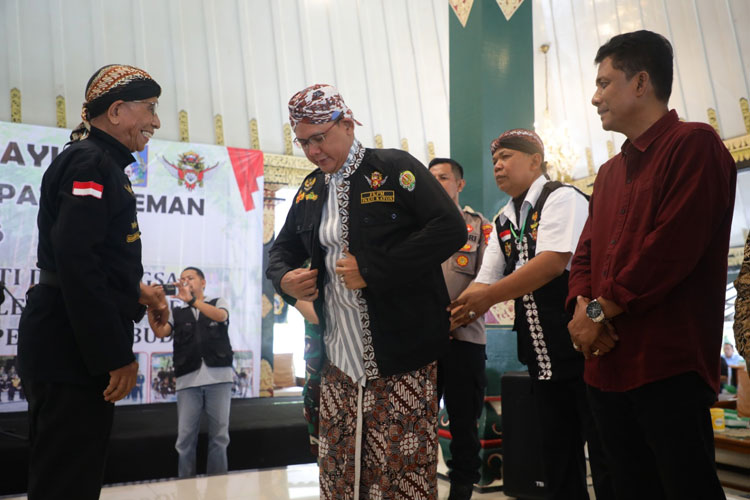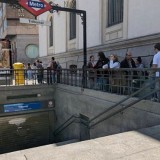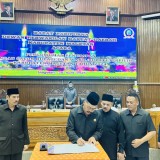TIMES INDRAMAYU, JAKARTA – Dealing with urgent cases might has been a normal thing for the health team anywhere including those assigned for pilgrims. On Friday (2/6/2023) at 23:15 local time in Saudi Arabia, Dr. Lebriandy and Dr. Sarah, members of the Crisis Management and First Aid Team for Hajj Pilgrims (PKP3JH), encountered a pilgrim experiencing distress in the vicinity of the Mataf area (the ground floor of the Tawaf area).
The pilgrim, aged 75, was part of the first group (kloter) from the Batam Embarkation (BTH 01). At that time, he complained of a throbbing pain in his chest. The two doctors immediately provided initial treatment by administering pain relievers such as paracetamol and ranitidine for gastric problems.
However, the pilgrim continued to complain of persistent pain. Cold sweat started to pour down his body, and he also complained of intense chest pain, as if his chest was being squeezed.
The Conditiion of the Pilgrim Getting Serious
Recognizing the increasingly serious condition, the PKP3JH team, along with other personnel, promptly evacuated the pilgrim to the clinic at Masjidil Haram. Upon their arrival at the clinic, the patient was referred to Ajyad Hospital as the case was classified as an emergency. It was around 23:30 at that time.
However, it turned out that Ajyad Hospital did not have complete medical facilities to perform invasive treatment. Therefore, the pilgrim was eventually charged to King Abdullah Hospital at around 23:50.
"At that time, we were really racing against time, as it involved the life of a person experiencing a heart attack," said Dr. Lebri, a member of the medical team, during an interview after assisting the pilgrim.
After an examination at King Abdullah Hospital, Dr. Lebri explained that the patient was diagnosed with an extensive anterior wall ST-elevation myocardial infarction (STEMI). Therefore, the patient required primary percutaneous coronary intervention (PCI) treatment. In this condition, there is damage to the heart muscle due to plaque blockage in the coronary arteries.
Further Treatments and Procedure for the Pilgrim
"A heart stent placement by a cardiac specialist is needed to open the blocked plaque in the coronary blood vessels and restore normal function," explained Dr. Lebri.
Moreover, Dr. Lebri continued, the pilgrim had a history of diabetes, hypertension, and smoking. Even during the post-stent placement care in the cardiac ward of King Abdullah Hospital, the patient experienced cardiac arrest. At that time, the medical team immediately performed CPR+DC shock.
"Alhamdulillah, through our efforts, Allah has determined that the patient can be well-treated. Currently, the patient's general condition is stable, and the plan is to start outpatient treatment," he said.
As general knowledge, here are some tips for early diagnosis of a heart attack. One typical sign of a heart attack in Asians is a feeling of stomach pain in the chest area. Therefore, pilgrims are advised to be cautious and promptly report any severe pain in the chest area.
Do not underestimate upper abdominal pain and report it immediately to the health team or the local authorities. This condition can potentially develop into a heart attack. Indonesian pilgrims in 2023 should prioritize their health and be aware of these symptoms. (*)
| Pewarta | : Khodijah Siti |
| Editor | : Khodijah Siti |
